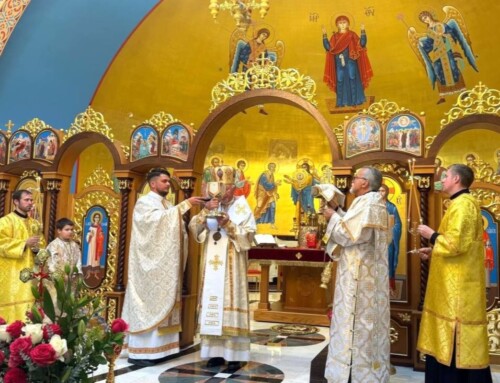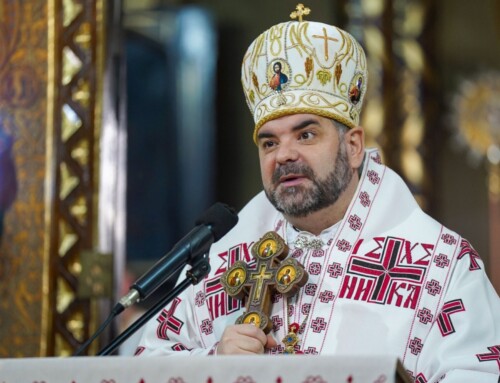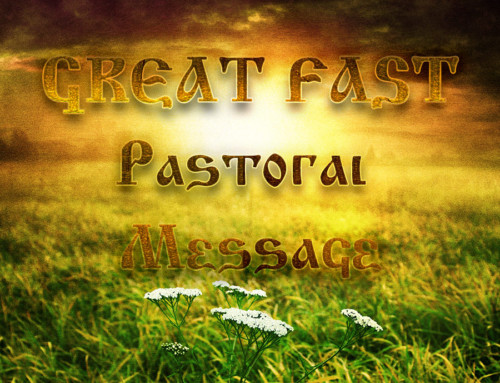EASTER PASTORAL OF THE UKRAINIAN CATHOLIC HIERARCHY OF THE U.S.A. TO OUR CLERGY, HIEROMONKS AND BROTHERS, RELIGIOUS SISTERS, SMINARIANS AND BELOVED FAITHFUL
CHRIST IS RISEN! TRULY HE IS RISEN!
Beloved Brothers and Sisters in Christ,
This Easter greeting resounds in a new and, for us, unfamiliar situation. We find ourselves celebrating, not in brightly decorated churches filled with joyful parishioners, with bells loudly ringing, but in the midst of a solitude and emptiness, that has enveloped our world due to the emergence of a virus that remains frightfully confusing for the average person, the virus known as COVID-19.
Especially now, it is so important for us to hear these words of hope and joy: “Christ is risen from the dead, trampling down death by death, and to those in the tombs giving life!” He also grants life to us—who live here and now, in the midst of a quiet world, that seems to have suddenly come to a standstill.
Pascha is the greatest and most joyful feast in the Christian calendar, a feast of overflowing happiness. It is interesting to note, however, that the Feast of Pascha begins with sorrow and emptiness.
The Evangelists, in their telling of the story of Easter, begin, not with the joy of the Resurrection, but with the sadness of the empty tomb. Mary Magdalene and the other women come, lamenting and sorrowful, early in the morning, to the grave of Jesus in order to anoint the body of their beloved teacher. Instead of Jesus’ body, however, they discover an empty tomb. Horrified, they think that someone has inexplicably stolen the body! Only then do they hear the angel’s announcement of Christ’s Resurrection: “He is not here for he has risen, as he said he would. Come and see the place where he lay” (Mt. 28:6). Only then do they encounter the risen Christ and embrace him: “And suddenly, coming to meet them was Jesus… and the women came up to him and, clasping his feet, did him homage” (Mt. 28:9). Only then, do they receive their commission from Jesus: “Do not be afraid; go and tell my brothers that they must leave for Galilee; there they will see me” (Mt. 28:10).
First comes emptiness, then comes fulfillment. First comes sorrow, then comes joy. First comes death, then comes life. Pascha begins with nothing and ends with everything!
When we think about it, we can say that there is a tiny reflection of the Paschal story in each of our lives. Just as Pascha begins with emptiness, so do our lives begin with emptiness. Before we take our first breath, we are called to leave the comfort of our mother’s womb. And throughout our entire life, every time we take a step forward, we are called to empty ourselves and leave something behind. Before we make a commitment to our spouse in marriage, we are called to let go of our independence. Before we respond to a vocation call or make a career choice, we are called to let go of other equally attractive opportunities. At every step of life, in order to receive new life, we are called to empty ourselves in some way.
The same applies to our spiritual life. Emptiness is part of the human experience, and over these past weeks in the midst of a global pandemic, it is an experience being shared by all humankind. Emptiness can bring emotional pain, yet at the same time, it can also be received as a spiritual gift. We all need that emptiness within ourselves: that space that makes room for something new, that space that can be opened to God.
This is why during the time of Great Lent, the Church in her wisdom, traditionally asks us to empty ourselves of the sins, temptations and daily preoccupations that clutter up our lives. Why? In order to make room for Christ, who rises triumphantly from the tomb today. He fills our spiritual emptiness with the promise that Resurrection brings—the promise of eternal life!
Our prayerful wish for each of us today on this glorious Feast of Pascha is that our hearts and souls be filled with the indescribable and incomparable joy of Our Lord’s Resurrection from the tomb. May this joy fill every emptiness within us, wipe away all pain and fear, conquer every doubt and temptation, and remain with us forever!
Let us follow the example of the holy women who visited the tomb at dawn on that first Easter morning—distressed with the empty tomb they received the fullness of joy. Let us embrace the Risen Christ who comes to fill our emptiness, especially in this time of global crisis. Let us with confidence and in the sureness of our faith, in word and deed, spread the Good News of his Resurrection throughout the world!



